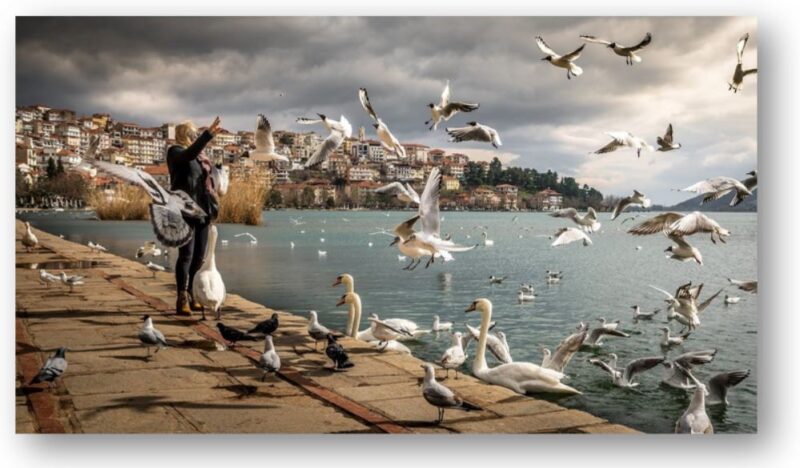Photo by GEORGE DESIPRIS from Pexels
Let Birds
(Click above)
I met Linda Gregg in silence first, through Jack Gilbert, through their poetry.
Later, by telephone.
In my world she’s one of the great disciples of real gut, romantic poetry,
herself half burned by love. A survivor of love.
Its angst, its grief, its grace, its longing. Without anger or bitterness.
To have everything as a poet is to have nothing.
To have all the time in the world is to lose time’s immediacy.
To have love is to know love’s slipping away. Like a river. Like the sky.
Like birds of a great sky, a great writer requires deprivation to find understanding.
I remember first reading “Country Woman” by Yannis Ritsos.
My imagination dimmed, listening without color to an old woman’s bedroom in Greece.
No candles would be lit by custom until she died. Yet, in the dark she asks for candles.
To look at her thin, dry hands one last time. Rough hands.
Worn from labor, field and home. Like dry trees having yielded much fruit.
And in that instant of light she understands how much love she has for her hands.
Like the love I have for Linda’s poetry. The sense of life in it. The sense of dying in it.
In the loss of the common a poet finds the uncommon.
In the loss of self, in its disembodiment, a poet finds her truer self.
As Linda did, in “Elegance,” In the Middle Distance (2006).
“All that is uncared for.
Left alone in the stillness
in that pure silence married
to the stillness of nature.
A door off its hinges,
shade and shadows in an empty room.
Leaks for light. Raw where
the tin roof rusted through.
The rustle of weeds in their
different kinds of air in the mornings,
year after year.
A pecan tree, and the house
made out of mud bricks. Accurate
and unexpected beauty, rattling
and singing. If not to the sun,
then to nothing and to no one.”
Written at a time when Linda was walking the desert every night,
four months having passed without her speaking a word.
A place to be when love is gone. (“Silence and Glare”)
“It is crucial that a poet see when she or he is not looking – just as she must write when she is not writing. To write just because the poet wants to write is natural, but to learn to see is a blessing. The art of finding in poetry is the art of marrying the sacred to the world, the invisible to the human.”
Four Months Silent
But, I fear, I’m letting myself get ahead of myself.
Linda and her twin sister, Louise, were born in Suffern, New York in 1942 – the third and fourth children, all girls, (the first, Chloe, born in 1937, the second, Susan, in 1939)
Chloe
Susan
of Harold and Frances Gregg, both originally of Petaluma, California. The following year, 1943, the Greggs returned to California with their four daughters, no place to stay, but a dream. They wound up living nearly twelve months in a tent, pitched in a makeshift camp under redwoods in Samuel P. Taylor State Park. And from there they began pursuing their dream of a school in California for children of all nationalities to learn each others’ customs and thoughts through the arts, nature, music, and dance.
Return to California
In 1944, the Greggs acquired 35 acres of land on Tamal Road in Forest Knolls, Marin County, and began constructing the site which became, in 1945 and for the next 24 years, Forest Farm, the country’s first racially integrated, co-ed summer camp west of the Mississippi (staffed by counselors that included those of Native American, African-American, Asian-American and South Asian descent). It was those uninhabited mountaintop acres that Linda and Louise had pretty much all to themselves nine months a year – the stillness of which informed Linda’s poetry and personality for life.
“I am made of the landscape in northern California where I grew up, made of my father’s uninhabited mountain where my twin sister and I spent most of our time as small children with the live oak trees, the stillness, the tall grass, the dry smell of the hot summer air where the red-tailed hawks turned slowly up high, where the two of us alone at ten did the spring roundup of my father’s twenty-six winter-shaggy horses. Down below there were salmon in the stream that ran by our house, the life of that stream and the sound of it as we lay in our bunks at night, our goat and the deer standing silently outside in the mist so many mornings when we awoke. The elements of that bright world are in my poetry now when I write about love or Nicaragua or the old gods in the rocky earth of Greece, just as the Greek islands where I lived for almost five years resonate in the poems I write now about the shelter for abused women in Manhattan or how a marriage failed in New England—but not directly.”
Finding Poetry
Harold Gregg was a visionary, thinker and active doer for social justice, in times of hardcore segregation and McCarthyism. One sweet example: In 1946, when one of their counselors, a Chinese-American, was refused admittance to a local swimming pool, Gregg and his wife brought the matter to a vote by their young campers. The solution was for Forest Farm to build its own swimming pool, which it promptly did.
San Geronimo Valley Community Center – Community Guide 2017, pp. 122-124.
One not-so-sweet example: One day when camp was in session five FBI agents came to the Farm, arrested Harold, drove him away, and interrogated him secretly for nearly a week. Because of his writings about the camp, and its racial integration, Washington suspected him of being a Communist, and of indoctrinating campers with his radical beliefs. After five days he was released – no evidence of any seditious activity existing.
Forest Farm
Years after Linda had left, the Forest Farm property was acquired and run as Serenity Knolls Chemical Dependency Center, where Jerry Garcia (Grateful Dead) famously died.
Old Man Gregg
Linda spoke of her father, from time to time, but sparingly. Which is curious, in my opinion. In “My Father and God” from The Sacraments of Desire she recounts how, the next morning after rain would fall in the desert, her father would be out there, lying on the sand alone at sunrise, to witness the ground being suddenly covered with tiny flowers. Because he believed it would bring him nearer to God. When he died, one night in 1980 of a heart attack, falling down by the fireplace in the middle of a game of chess, he roared like a bear, and Linda’s sister thought he was only playacting. The next year Linda wrote “Skylord” for him (without mentioning him specifically, except in the dedication) – obscurely likening her father’s life and death to a small hawk “shivering with great energy” in the air, hunting for mice on the ground. “[T]he sky too has its stomachs to feed and must come down to us and learn our ways….”
Marin Conservation League Newsletter, May/June 2019, pp 2 and 5.
Twenty years or so before her father’s death, when Linda was still a teenager, he kicked her out of the house; and she wound up living on a houseboat moored in Sausalito, across the Golden Gate from San Francisco, owned and occupied by Smyrna-born, Greek-French artist Jean Varda, called the Vallejo. Another significant chapter in the Linda Gregg life for which I can find precious little but imagination to describe.
Refuge
With Jean Varda
Life on the Vallejo at that time was intertwined with the counterculture movement in San Francisco and Marin County, and with names like Druid Heights, Allen Ginsberg, Elsa Gidlow, Tom Robbins, Lily Tomlin, Alan Watts, and Maya Angelou.
Druid Heights
Elsa Gidlow
Ending her stay on the Vallejo, Linda enrolled at San Francisco State University, where she soon met poet Jack Gilbert (Gilbert, 17 years her senior), sitting at the rear of a class he was lecturing. A romance began and lasted, in its way, from 1962 to 1970. From San Francisco to Greece to Denmark and back to Greece, as their poetry details. But what’s more, a tight friendship also developed, which lasted a lifetime. All the way till Gilbert’s death in 2012 in Berkeley. (If what is “love” is both part “passion” and part “god,” the two of them held the second part without failing, or falling, for their entire lives.)
Considering all this, I find myself conflicted, and not for the first time.
Both Linda and Jack, in my mind, are among America’s great poets.
I have my reasons. Personal reasons.
And I know full well that you need to form your own opinion free of mine.
For what I prize is not only their poetic genius and originality,
but also their indomitable faith in love. It’s their poetry I’m claiming to be great.
And their almost religious dedication to living the enigmatic, frequently impoverished life of poets, in Spartan circumstances, outside conventional society.
Naked, heartbreaking, true, and unforgettable poetry.
Naked, heartbreaking, true, and unforgettable lives.
Here is a glimpse: Jack and Linda in Denmark –
“My husband sucks her tits.
“The Wife,” Too Bright To See
He walks into the night, her Roma, his being alive.
Toward that outer love. I wait in the hotel
until four. I lurch from the bed
talking to myself, watch my face in the mirror….
I grow specific without consequence.”
You might find informative, Andrew Bennett’s analysis of this poem in “Deprivation and Apprehension in Yannis Ritsos, Linda Gregg and Jack Gilbert,” pp 13-15.
“….. It has been ten years since I sat
“Marriage and Midsummer’s Night,” Alma
at the open window, my legs over the edge
and the knife close like a discarded idea.
Looked up at the Danish night,
that pale, pale sky where the birds that fly
at dawn flew on those days all night long,
black with the light behind. They were caught
by their instincts, unable to end their flight.”
Jack, in defense –
“Watching my wife out in the full moon,
“Trying to be Married”
the sea bright behind her across the field
and through the trees. Eight years
and her love for me quieted away.
How fine she is. How hard we struggle.”
“Walking home across the plain in the dark.
“Walking Home Across the Island”
And Linda crying. Again we have come
to a place where I rail and she suffers and the moon
does not rise. We have only each other,
but I am shouting inside the rain
and she is crying like a wounded animal,
knowing there is no place to turn. It is hard
to understand how we could be brought here by love.”
“Plunging water flashing as she washes her body in the sun.
“A Kind of World”
Light going away every evening like some great importance.
Linda talking less and less. Going down to the sea
while she sleeps. Standing in the cold water to my mouth
just before morning. Linda saying late in the day
we should eat now or it would be too dark to wash the dishes.
She going out quietly afterward to scream into the wind
from the ocean. Coming in. Lighting the lamps.”
“Everyone forgets that Icarus also flew.
“Winning, Failing and Flying”
Like when love comes to an end,
or the marriage fails and people say
they knew it was a mistake, that everybody
said it would never work …. It tempts me
to say that everything really worth doing
is worth doing badly. I boast inside
about how it was being with Linda there
by the perfect sea on our deserted side
of the island while the love was fading
out of her. The stars burned so extravagantly
those nights that anyone could tell
they would never last. She would be asleep
in my bed every morning like a visitation,
the gentleness in her like deer standing
in the dawn mist. I got to watch her
every afternoon coming through the hot
stony field after swimming, the Aegean
tight behind her and the giant sky
on the other side of that. I listened to her
talk while we ate lunch. Dear God,
what a failure. Like getting old with that
alive inside me. The same people came back
from seeing Provence when it was still what
it used to be and said it was pretty but how
greasy the food was. I like to think
that Icarus was not failing as he fell,
but just coming to the end of his triumph.
What a blessing it was to be with her
when she was changing clothes in that silence.”
Jack’s infidelity ruptured something passionate.
Something passionate inside Linda.
The breaking point, she told me,
came when Jack dismissed her cries of pain and betrayal,
telling her if she didn’t like it, she could leave.
They never made love again.
After Greece (and Denmark) with Jack, Linda returned to California to continue her academic education, and to write. By 1981 she was living in Amherst, Massachusetts, married to fellow writer, professor, and political activist, John Brentlinger* and publishing her debut book – Too Bright To See. Her second book of poetry, Alma, was likewise published during her marriage; but it sold miserably. By the time the manuscript of her third book was completed, The Sacraments of Desire – 1990 – Linda had commenced an affair with the unnamed, Great Love of Her Life – sacrificing her marriage for it, and uprooting her life from Western Massachusetts to an old building in Chicago, where she spent the lion’s share of days and nights alone, waiting to be visited. By her married lover.
“there were few days at a time. Soon, only hours.
In general from “The Spirit and What Is Left Behind,” Chosen by the Lion
At night, lying in bed, I would hear your key.
Perhaps your voice, saying ‘Linda.’
Briefly…. Briefly.”
“I was a secret. You were married.
In general from “I Thought on His Desire for Three Days,” Chosen by the Lion
I was a whore. Your wife called me. Perhaps.”
“The nipples you bit and the body you possessed lie buried in you.”
“Chosen by the Lion,” Chosen by the Lion
“Jack was right. You couldn’t sustain love when it started to cost you.
In general from “The Terrifying Power of Darkness Is Inseparable from the Redemptive Power of the Sacred,” Chosen by the Lion. Emphasis added by me.
You couldn’t sustain love when it started to cost you.
It is the pain now that makes me remember you.
That brutal phone call in my empty room, into my empty body.
I always thought joy was the normal way.
The ordinary way.”
“I longed for your agreement and approval.
From “A Bracelet of Bright Hair about the Bone,” Chosen by the Lion.
Wanted you to understand the hugeness of love.”
When that romance ended, in 1994, Linda reached the darkest moments of her life, documented in her fourth book, Chosen by the Lion, arguably some of her most poignant pieces ever written. Yet, ever so thankful to have had any time with him all.
READ:
Asking for Directions
Let Birds
The Weight
The Defeated
“Balancing Everything” from All of It Singing, Graywolf Press, 2011, page 44
Timothy Liu
As Linda says:
“The soul must be experienced to be achieved.”
“God’s Places,” Chosen by the Lion.
Over the next several years after Chicago, Linda found various places of refuge – one in Greece; another in the isolation of the desert around Marfa, Texas. It was a significant transition in her life – one for which I can offer but these eight bits:
“I live in silence and the memory of love. I am happy even here.”
From “Not Memories but a Quality Remembered,” Chosen by the Lion.
“I’ve come back to the country where I was happy
changed. Passion puts no terrible strain on me now.
I wonder what will take the place of desire.
I could be the ghost of my own life returning
to the place I lived best….”
Adult
“Without even looking in the album
I realized suddenly, two months later,
you had stolen the picture of me.
After you had hurt me so much,
how could you also take the picture
from me of a time before I knew you?
When I was with Jack.
Steal the small proof that once
I lived well, was loved
and beautiful.”
Lessening
“I remember all the different kinds of years.
“Arriving Again and Again Without Noticing,” from In the Middle Distance.
Angry, or brokenhearted, or afraid.
I remember feeling like that
walking up the mountain along the dirt path
to my broken house on the island.
And long years of waiting in Massachusetts.
The winter walking and hot summer walking.
I finally fell in love with all of it:
dirt, night, rock and far views.
It’s strange that my heart is as full
now as my desire was then.”
“Eight years later the woman is given
“They Cripple with Beauty and Butcher with Love,” from In the Middle Distance. Emphasis added by me.
a house for five months at the edge of town
in the desert. It’s August and the desert is green.
When rain falls, she drives beyond the dark clouds.
Past an antelope, legs resting under it,
head raised, white marks. Drives slowly around
a turtle. If the man lied about love,
or even if was true, there was immense damage.
When she woke, she was at the beginning where
love ends. Beauty everywhere on the road.
Silence inside her body in the clear
evening air, near the Mexican border.
“It is possible to be with someone
From “The Presence in Absence,” In the Middle Distance. Emphasis added by me.
who is gone. Like the silence which
continues here in the desert while
the night train passes through Marfa …
the dogs whining and barking after the train is gone.”
“The memory of things I have loved
From “Changed or Cheapened,” In the Middle Distance. Emphasis added by me.
seems worn, built over, changed or cheapened.
But other times are still wildly fresh….
important that the … essence … be protected….
There must always be the bite of
the creek’s smell. The face of the man
I love when he was asleep. I worry
that talking about it will turn
these sentences into words ….”
“In the concert of being present.
I have lost my lover and my youth.
I want to praise the meadow, the horse
rolling over in the river with me
as a girl underneath it. Surviving to see
the ferns in the woods, sunlight on blond hills.”
Arriving
The final years of Linda’s life were primarily spent in a rent-controlled New York City apartment in the East Village, her writing trickling to a halt after Jack’s death in 2012. What passion may have split them never played a part in the true love that united them. Her last door was great pain, dying (2019) at Beth Israel Hospital, eight blocks from her home on St. Marks.
READ Linda’s final poems of Jack, in his declining years:
“After the Fires,” All of it Singing
“Getting Value,” All of it Singing
“You Never Loved Me,” All of it Singing
“Whoever,” All of it Singing.
AND READ:
Alex Dimitrov
Love is endless. Like the Penrose stairs.

“We are not allowed romance but only its distance.”
Linda Gregg, “New York Address,” Alma.

Photo by Johannes Plenio from Pexels
I had the thought of writing a play, essentially comprised of Linda’s and Jack’s poetry, telling the story of their loves and their lives. A bit naïve on my part. Yet my idea came with a silver lining: my meeting Linda (by telephone). Their poetry had captivated me. Which I tried to convey to her, midst stories of hers from California to New York to the other places she had been in the world. (But never Cincinnati.) For Jack Gilbert, there are three absolute must reads –
A Brief for the Defense
Everywhere and Forever
from The Dance Most of All, Knopf, 2009
The Lost Hotels of Paris
“The Lord gives everything and charges by taking it back…. We are allowed to visit hearts of women, to go into their bodies so we feel no longer alone.”
James Dickey said about Jack: “He takes himself away to a place more inward than is safe to go. And from that awful silence and tightening, he returns to us poems of savage compassion.”
For Jack and Linda, in addition to what’s above, read:
I Am Supposed to Look
In the Middle Distance eNotes
“Thinking about how suffering is part of sexuality causes turmoil when you’re young. And then you come to absorb it.” – Raena Shirali, quoted in
Alina Pleskova
Paris Review
What is great poetry, if not the expression of the heart transcendental within us?
If not the emotional equation of life, memory, and loss?
If not the caught idea, ephemeral, like a dream, that sees to the other side of being?
If not a stop on our journey to reunite the soul, connecting the warmth, purity, love, and innocence of youth, with the pain, disillusionment, longing, and loneliness learned later?
Poetry searches out feelings beyond feelings beyond the sound of words.
And at its furthest point, poetry searches out a love for the poet herself.
I found the Linda Gregg I love alone at night. Reading her.
When will I find her again?
For I’ve not yet let Linda quite die.
Inside me.
She’s opened wounds her poetry has not stanched.
Every time I read her it brings the pain back.
The absoluteness of it.
The absoluteness of two hands rubbing together with sand on them.
The loss and the memory of loss.
How can you find words to breathe when you’ve been kissed so hard?
Those who’ve loved a great poet*** surely must know.
Those like me who have searched beneath the sand.
Within the shells of joy.
Deeper than the dark.
Deeper down where something holds its breath.
Where we have no words for it.
Linda. Why?
Why were you able to live with the memories of loss as though they were found?
How were you able to have the stubbornness to accept gladness with the sorrow?
To look one last time into the face of the man you loved most,
and know he loved you permanently,
and be gone?
And back again I come to the food, and wine, and words, and bodies of women life has given me to remember.
And to remember that to be a poet one has to suffer.
I suppose the greatest poets are those who act upon it.
Which would make Lincoln and Martin Luther King this country’s greatest poets.
Which, I guess they are.
But I love you, not them.
And I love the children I’ve had inhabit my life.
And I love the love.
And I know I have been so blessed to have had them all.
And the clockwork of faith which turns within me.
And never to have been swamped, or sunk, in seas of wealth.
The last ship of life is in waters of memory.
Linda Gregg accepted that fact that I resist.
She accepted life’s constraints.
Love’s constraints.
The hugeness of love.
What God has joined together let no man put asunder.
God and Passion are neighboring pillars in the hearts of men.
There are times I revisit my memories of stories like The English Patient.
And The Piano.
And The End of the Affair.
And Anna Karenina.
And ask myself: Was it so wrong for Linda to love him? Married as he was.
It is Passion, and not sex, that joins two hearts together across the trails of life.
Sex is neither Passion nor Love, but only a mirror of them.
With endless time I’d need an endless mind. No thanks.
And thus I’ll die in Spring, if Spring shall be the shore,
where I can sleep in arms whom I adore.
Draw me a picture.
Round and round and round she goes.
Where she stops, nobody knows.
And let there be space in it. Let there be space.
Let space. Let space.
A river runs through it. With no bitterness.
And if Spring is long enough, I’ll write a movie about the two of them.
We are meant to live for this life. And love for this life.
But what when Love plays a hiding game?
Love is where great poetry begins. And pain is where it ends.
Reconciling with what love is. Always alone.
Always Alone
Singing Enough to Feel the Rain
Additional LINDA GREGG –
With Jack
With Henry Lyman
Women’s Voices
NYU
Hurley
Full Collection

Photo from Wikipedia.org
* John Brentlinger, roughly seven years Linda’s senior, taught Greek philosophy at the University of Massachusetts in Amherst, and then turned Marxist philosopher and activist, spending a great deal of time documenting the struggles of the people in Puerto Rico and Nicaragua. He and Linda divorced in 1990.
**
*** Jesus of Nazareth. Muhammad. Rumi. Shakespeare. Mozart. Beethoven. Van Gogh. Castaneda. Ingmar Bergman.

